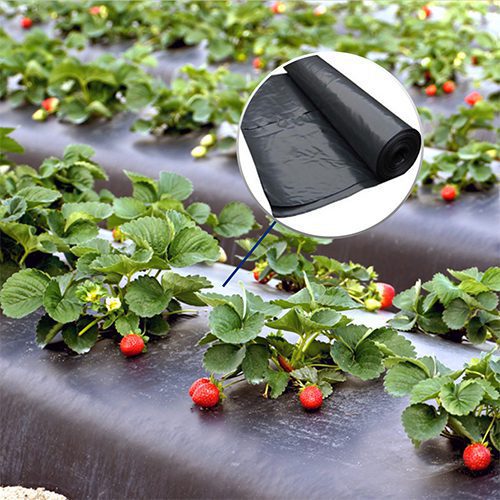One of the main concerns for those with farmland or spaces for growing plants, vegetables, and more, is finding solutions to prevent soil quality from deteriorating. If you have agricultural land or a large green space in a dry or semi-dry area, one of the ways to improve irrigation efficiency and protect the soil is by using agricultural mulch film. Once this solution is identified, many questions arise among farmers and gardeners, such as which type of mulch is best, and what the benefits of using mulch are. If you want to learn more about agricultural mulch film and its benefits, stay with us until the end. In this article, we will answer all your questions regarding mulch film.
What is Agricultural Mulch Film?
In general, mulch refers to a covering placed on the soil surface to protect and improve soil quality. In the past, organic or natural mulches such as straw, dry grass, leaves, and shredded wood were used, but today, to achieve faster results and better performance—especially for crops like tomatoes, peppers, corn, and generally most warm-season plants—non-organic, plastic mulches are more commonly used.
The idea of reducing costs and making mulch use easier, as well as making mulch environmentally friendly, started in the 1960s. In the last decade, with technological advancements and production equipment, this idea has led to the creation of plastic mulch films. These non-organic mulches are made from polyethylene or plastic and have a longer lifespan compared to other types of mulch. Due to their thickness, quality, and flexibility, plastic mulches are easy for farmers and gardeners to use and place on the soil surface.
What are the Benefits of Using Plastic Mulch Film in Agriculture?
For those who want to know the benefits of plastic mulch film in agriculture and ensure the quality of their soil, we have explored this topic further in this section:
1. Early Harvest
The first benefit is that plastic mulch helps produce earlier crops. Plastic mulch absorbs sunlight and, by reducing air circulation, increases soil temperature and retains heat, preventing cold weather from harming plant seedlings. With quicker harvests, you can bring your products to market earlier and sell them before your competitors.
2. Reduced Watering Frequency
Another advantage of plastic mulch in agriculture is the reduction of excessive evaporation. By decreasing evaporation and water loss, the need for frequent irrigation is reduced. This means that mulch helps save water, making irrigation more efficient.
3. Prevention of Nutrient Loss in Soil
If you combine the use of plastic mulch with drip irrigation, you can prevent nutrient loss in the soil caused by leaching. The mulch covers the soil and prevents nutrients from being washed away.
4. Weed Control
If you choose dark-colored plastic mulch, it can help reduce the growth of weeds. These types of mulch prevent photosynthesis in other plants, creating conditions where weeds cannot access water and nutrients from the soil to grow.
5. Improved Product Quality
After the crops are harvested, the plastic mulch covering the soil and the crops prevents them from coming into contact with the soil. This protects the crops, preventing damage and improving product quality.
6. Prevention of Soil Erosion
Plastic mulch also prevents soil erosion caused by wind and other natural or unnatural factors, ensuring that the soil quality is maintained throughout the growth cycle of the plants.
7. Creates an Ideal Environment for Root Growth
For a crop to be successful, its roots need to grow in an optimal environment. Plastic mulch provides this ideal condition, allowing roots to grow and expand effectively.
Additional benefits of using plastic mulch include reducing fertilizer runoff, preventing plant moisture stress, preventing salt crust formation on the soil surface, avoiding soil compaction, stabilizing temperature fluctuations, and more. Agricultural mulch film is a type of agricultural plastic, and its applications and benefits are closely related to the use and advantages of plastic in agriculture, as each type of agricultural plastic has its unique uses and benefits in various agricultural sectors.
Key Considerations When Buying Plastic Mulch Film
It’s important to know which type of mulch is best suited for your needs. For example, after reading about the benefits of using plastic mulch in agriculture, if you’ve decided to choose plastic mulch for your farmland, you need to ensure that the mulch type matches the season in which you intend to use it. For example, use summer mulch for warm seasons and winter mulch for cold seasons.
The functions of these two types of mulch differ. Winter mulch is used when you want to create an insulating layer over plants, while summer mulch is used to prevent heat from penetrating the soil. Additionally, the type, thickness, and color of plastic mulch should be chosen based on the type of plants, soil conditions, and the local climate, so that the mulch performs optimally.
Final Conclusion on Using Agricultural Mulch Film
If you have agricultural land, you are likely concerned about soil conditions, product quality, and harvest time. This article examined the benefits of using plastic mulch film in agriculture so that you can make the best decision for protecting and maintaining the soil and plants in your field. By selecting the right plastic mulch film, you can reduce the frequency of irrigation, maintain soil quality, prevent weed growth, temperature fluctuations, or moisture stress from harming the soil and plant roots, and bring high-quality products to the market more quickly.

